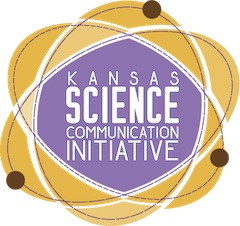January 28, 2019
Division of Biology faculty member attends Alan Alda Center science communication workshop

The Alan Alda Center for Communicating Science hosted its STEM Immersion 2019 workshop Jan. 10 and 11 in New York City. Invited researchers learned how to communicate and connect with general audiences when sharing scientific research. Michi Tobler, associate professor of biology, applied and was selected to attend.
Tobler's research investigates the origins of biodiversity using fishes in extreme environment as a study system. Below, he shares some of the knowledge he gained from the science communication workshop and how he will bring that expertise to K-State.
Q: What were your biggest takeaways from the Alan Alda Center for Communicating Science workshop?
A: I really got more comfortable with the idea to give up control, listen and let the conversation veer into unfamiliar territory. This has helped me to better relate to audiences and connect my research to their experiences, rather than just pushing my preconceived talking points.
Q: What did you learn about the Alda Method for teaching scientists how to communicate with nonscientific audiences?
A: I came to appreciate the value of improv techniques in science communication. I have participated in multiple improv workshops in the past, but I never quite understood how I can directly apply some of these skills to communicate my work. The instructors at the Alda Center did an excellent job helping me connect those dots.
Q: Why is knowing how to communicate about science an important skill for people in STEM fields?
A: As scientists, we are funded by and work for the public. To me, it is a professional obligation to be accountable for the work we do, and that requires that we engage with nonexpert audiences. By engaging with communities outside of academia, scientists also contribute to solving pressing societal problems and inspire the future generation of scientists. And let's face it, getting people all excited about your research is really fun!
Q: How does communication fit into your role as a K-State researcher?
A: It's part of my job as a scientist and educator at a land-grant university. By being more cognizant of how I communicate, I hope to become a better teacher to our students and spread some excitement about the work we do beyond K-State.
Q: What changes will you make based on what you learned at the workshop?
A: The experience at the Alda Center will definitely change how I approach science communication, especially when it comes to tailoring the message in a way that speaks to an audience. More importantly, it will change how I approach helping others to improve their science communication skills by incorporating some of the new experience into our workshops and courses.
Q: To you, what's the biggest hurdle that scientists and researchers face when sharing their research with the public? Did the workshop tackle that issue?
A: It must be curse of knowledge. It can be hard to forget what we know when we try to explain something to somebody with a different background. It fundamentally impacts not only what we talk about, but also how we talk about it and how we are perceived. So, if you cannot relate to your audience, you lose it before a meaningful interaction can develop. The workshop helped me to improve strategies to stay in tune with my audience and dynamically change my storytelling if needed.
Q: The Kansas Science Communication Initiative will host the SciComm 2019 Conference at K-State in March. What ideas will you bring from the Alda Center workshop to this campus?
A: At SciComm 2019, I am excited to work with Jared Bixby from Sunset Zoo and offer a preconference workshop on "How to Science on Tap." The workshop focuses on storytelling exercises, visual communication and audience engagement strategies that will allow scientists to easily tweak their science story to audiences with different backgrounds and interests. Some of the activities from the Alda Center that helped me will definitely inspire some of the new workshop elements.
Q: What's your biggest piece of communication advice for students involved in research? How about for faculty?
A: It's the same for everybody: remember that we all wear many different hats. Yes, we are scientists. But we are also parents and siblings and dog lovers and foodies and advocates for recycling and equal opportunity, and whatever else! When you have so many hats to wear, it's perhaps not always best to wear your scientist hat when you talk to nonexpert. Try wearing a different hat — one that the audience can easily relate to — and it might open interesting ways to talk about science. The best part is that you don't even have to pretend to be somebody that you are not. Just be yourself and wear the right hat for every occasion.
Find more information about science communication opportunities at K-State by visiting the Kansas Science Communication Initiative website or following KSCI on Facebook and Twitter (@KS_SCI). The Kansas Science Communication Initiative will host the SciComm 2019 Conference at K-State in coordination with the University of Nebraska-Lincoln on March 22-24. The conference centers itself around promoting effective communication between scientists and the general public through multiple modes of sharing ideas.